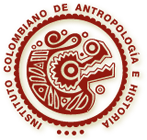Colombian Institute of Anthropology and History
The Colombian Institute of Anthropology and History (Spanish: Instituto Colombiano de Antropología e Historia), ICANH, is a scientific and technical government agency ascribed to the Ministry of Culture in charge of researching, producing and disseminating knowledge in the fields of anthropology, archeology and colonial history to protect the archaeological and ethnographic patrimony of Colombia.[4]
| Instituto Colombiano de Antropología e Historia | |
 | |
| Agency overview | |
|---|---|
| Formed | 24 December 1999 |
| Preceding agencies |
|
| Headquarters | Calle 12 № 2-41 Bogotá, D.C., Colombia |
| Annual budget | COP$8,379,225,798 (2011)[1] COP$9,602,340,786 (2012)[2] COP$10,426,541,605 (2013)[3] |
| Agency executive |
|
| Parent agency | Ministry of Culture |
| Website | www |
History
The National Archaeological Service was founded in 1938 in Colombia.[5] In 1941, the National Ethnological Institute was founded by Paul Rivet. President Eduardo Santos Montejo invited Rivet to come from France to establish an academic teaching institute, which would formalize anthropological studies in the country. The institute was to be founded on scientific principals to investigate and analyze the diverse ethnic groups of Colombia.[6][7] In 1952, the two organizations were merged, to form the Colombian Institute of Anthropology under the Ministry of Education. One year previously, the Colombian Institute of Hispanic Culture had been formed to preserve the Spanish culture of Colombia. In 1999, this organization was merged with the Colombian Institute of Anthropology to form the present entity.[5]
See also
References
- Colombia, Congress of (13 December 2010). "Ley 1420 de 2010" (PDF). Diario Oficial (in Spanish). Bogotá (47, 922): 28. ISSN 0122-2112. OCLC 500057889. Retrieved 6 May 2013.
- Colombia, Congress of (14 December 2011). "Ley 1485 de 2011" (PDF). Diario Oficial (in Spanish). Bogotá (48, 283): 14. ISSN 0122-2112. OCLC 500057889. Archived from the original (PDF) on 9 January 2014. Retrieved 6 May 2013.
- Colombia, Congress of (10 December 2012). "Ley 1593 de 2012" (PDF). Diario Oficial (in Spanish). Bogotá (48, 640): 13. ISSN 0122-2112. OCLC 500057889. Archived from the original (PDF) on 9 January 2014. Retrieved 6 May 2013.
- "Acerca del ICANH: Misión" (in Spanish). Colombian Institute of Anthropology and History. Archived from the original on June 11, 2007. Retrieved 2010-02-12.
- "Antecedentes Históricos". ICANH (in Spanish). Bogatá, Colombia: Instituto Colombiano de Antropología e Historia. 26 October 2012. Archived from the original on 1 July 2017. Retrieved 23 September 2017.
- Echeverri, Marcela (1998). "La Fundación del Instituto Etnológico Nacional y la Construcción Genérica del Rol de Antropólogo" [The Foundation of the National Ethnological Institute and the Generic Construction of the Role of Anthropologist]. Anuario Colombiano de Historia (in Spanish). Bogatá, Colombia: Universidad de Los Andes (25): 216–247. Retrieved 23 September 2017.
- Barragán, Carlos Andrés (2013). "El Rastro de la Arqueóloga, la Mirada de la Antropóloga: diálogos con Alicia Dussán de Reichel y su obra" [The archaeologist's trail, the anthropologist's gaze: dialogues with Alicia Dussán de Reichel and her work]. Maguaré (in Spanish). Bogotá, Colombia: Universidad Nacional de Colombia. 27 (2): 199–253. ISSN 0120-3045. Retrieved 23 September 2017.